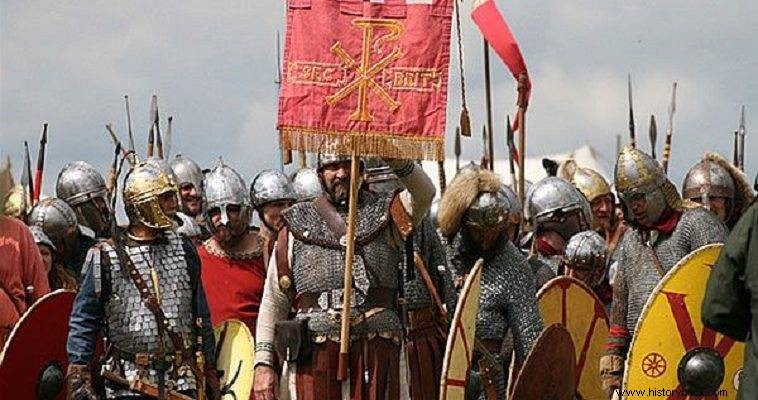
Ioannis Troglitis is one of the relatively unknown generals of the Justinian period. he is thought to have been born in Macedonia, rather in the region of Serres, or in Thrace. It is believed that he had relations with Belisarius since childhood and was a member of the first unit of elite Bucellarian cavalry organized by the great general.
His date of birth is not known. However, as the sources mention him as the same age as Belisarius, he should have been born between 500 and 505 AD. He followed Belisarius on his first campaign on the Danube and then on the campaign against the Sassanid Persians in Mesopotamia. He was present at the famous battle of Daras, while he followed the glorious general to Italy in the war against the Goths.
To North Africa, where he was to be glorified, he also went with Belisarius. He played a catalytic role in the battles of Decimos and Trikamaros, leading the elite Bukelarians. In fact, in the first battle, with only 288 men, he pursued the barbaric German Vandals to the walls of Carthage. John is mentioned by the historian Procopius as John the brother of Pappus.
Most of the information available about John comes from the epic poem "John or About the Libyan War", by Flavius Corripus . There it is mentioned that his father's name was Evanthis. It is also mentioned that he had a son, Peter, while he was married to a king's daughter. Some argued that he had married the daughter of Justinian's nephew. But this is probably not true and it is considered more likely that his wife was the daughter of a barbarian ruler.
As mentioned, John arrived in North Africa with Belisarius in 533 AD. He remained there after the latter's departure the following year and was one of the sub-generals of the commander of Solomon's province in the war against the Numidians in 534-535 having been promoted to duke, i.e. military commander, of the province of Tripolitania or, according to other sources, of Byzacion.
From this position he managed to face raids by various tribes in the area while also participated in the fight against the revolutionary Goth mercenary general Stotza . On Belisarius' return to North Africa he fought against the great general at the battle of Mabresa in 536, when with only 2,000 the two friendly generals defeated at least four times as many men as Stotza.
He then fought under the general Germanus, Justinian's nephew and distinguished himself in the important victory of the Byzantine forces at Skalas Vetere, in 537 . In this battle he commanded the right wing of the army. Procopius mentions that the attack he launched was repulsed and he was forced to retreat, even losing a banner. However, this information is verified as the battle ended with the triumph of the Byzantine arms. It is possible that John's retreat was a ruse. The following year he defeated the rebels at the battle of Autedi in the province of Byzacion.
Immediately after that, however, he was transferred to the East. There in 541 he assumed the position of duke of Mesopotamia, in the most critical region of the border with the eternal enemies Sassanid Persians . He even managed to capture an ambassador from the Ostrogoths of Italy to the Persian king who had been sent to forge an alliance between the Ostrogoths and the Persians so that the Sassanids could attack from the east while important imperial forces were anchored in Italy.
When the new war with the Persians finally broke out, John achieved a series of victories. Near Nisivi he defeated the Persian army of general Nabidi while in Theodosiopolis, with an inspired night attack, he crushed the Persian army that was besieging the city. He then achieved another crushing victory over the Persians besieging the city of Daras and captured the general Mir Meroe, Corripus reports.
Then he was sent to North Africa where he managed to crush the Numidians. John remained the military commander of the provinces he saved until the end of his life and later shared the civil administration with the prefect Athanasios.
He saw to the reconstruction of the fortifications throughout the region, reorganized the military and civil administration and dealt wisely with the Numidians so as not to give rise to new rebellions . According to the modern historian John Bury, John Troglitis was the third, after Belisarius and Solomon, hero of the operation to recover northern Africa from the Empire.
This was also supported by his contemporary biographer, in fact, Korripos. Under his administration there was such order and peace that when the Ostrogoths of Totila counter-attacked in Italy, John was able to send almost all of his imperial troops to deal with them, without fear of rebellion.
It is not known exactly when John died, however it was definitely after 552 AD. But his work endured even after his death and peace in the region was maintained for a long time.
